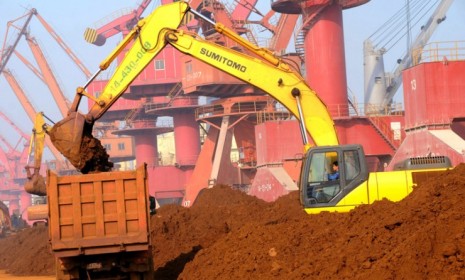Obama vs. China: The battle over 'rare earths'
The U.S. accuses the world's most populous nation of hoarding precious metals that are vital to the creation of high-tech products, from iPhones to missiles

A free daily email with the biggest news stories of the day – and the best features from TheWeek.com
You are now subscribed
Your newsletter sign-up was successful
The U.S., the European Union, and Japan are talking tough on China, blasting the world's most populous nation for curbing the exports of 17 "rare earth elements," which boast magnetic properties that make them essential components in advanced computer and weapons technology. Without rare earths, we wouldn't have computer hard drives, hybrid car batteries, wind turbines, radar systems, and many other gadgets. And China sells more than 95 percent of the world's total supply of rare earths, putting it in a dominant position to control the market — and best its competitors. Here, a guide to the battle over rare earths:
Why does China have a near-monopoly on rare earths?
It's all about cost. China is estimated to possess only 30 percent of the world's rare-earths deposits, but mining rare earths is expensive, and can be highly damaging to the environment. In the U.S., it costs about $1 billion to open a rare earths mine, and it takes 15 years for the mine to become operational. China, on the other hand, takes advantage of "lax environment and worker protections" and "state-financed mining operations" to make rare-earths mining profitable, says Bloomberg. Corporations in the developed world can't compete, and have effectively ceded the market to the Chinese.
The Week
Escape your echo chamber. Get the facts behind the news, plus analysis from multiple perspectives.

Sign up for The Week's Free Newsletters
From our morning news briefing to a weekly Good News Newsletter, get the best of The Week delivered directly to your inbox.
From our morning news briefing to a weekly Good News Newsletter, get the best of The Week delivered directly to your inbox.
What is China accused of doing?
In a complaint with the World Trade Organization, the U.S. and its allies claim that China has halved its exports of rare earths, which drives up prices. In addition, China is accused of setting exorbitant tariffs on rare-earths exports. China's policies are an attempt to "flex its economic muscle," says The Washington Post, by "aiding Chinese companies that use rare earths while driving up the costs of the metals" for the rest of the world. China's military also enjoys an advantage, since the use of rare earths is "widespread" in U.S. defense systems, says Politico.
What's next in the dispute?
China, which says the export quotas are necessary to protect its environment, and to ensure that its rare-earths mining is sustainable, technically has 60 days to settle the charges amicably. But it's unlikely they will, and analysts say that the case will probably drag on for years, forcing the U.S. and others to find other sources of rare earths.
A free daily email with the biggest news stories of the day – and the best features from TheWeek.com
Are countries starting to mine their own rare earths?
Yes. The U.S. currently has only one rare-earths mine, in California's Mojave Desert, which is boosting production. Another mine in Wyoming is expected to begin mining in five years. But there are "fewer than a dozen rare-earth mines outside China" that currently have the capacity to produce a meaningful amount of rare earths, says The Wall Street Journal.
Sources: Bloomberg, The New York Times, Politico, Reuters, The Wall Street Journal, The Washington Post
-
 Local elections 2026: where are they and who is expected to win?
Local elections 2026: where are they and who is expected to win?The Explainer Labour is braced for heavy losses and U-turn on postponing some council elections hasn’t helped the party’s prospects
-
 6 of the world’s most accessible destinations
6 of the world’s most accessible destinationsThe Week Recommends Experience all of Berlin, Singapore and Sydney
-
 How the FCC’s ‘equal time’ rule works
How the FCC’s ‘equal time’ rule worksIn the Spotlight The law is at the heart of the Colbert-CBS conflict